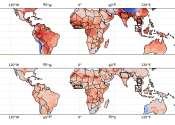Study shows it's not too late to save the West Antarctic Ice Sheet
New research has found a "missing piece of the puzzle" of West Antarctic Ice Sheet melt, revealing that the collapse of the ice sheet in the Ross Sea region can be prevented—if we keep to a low-emissions pathway.









